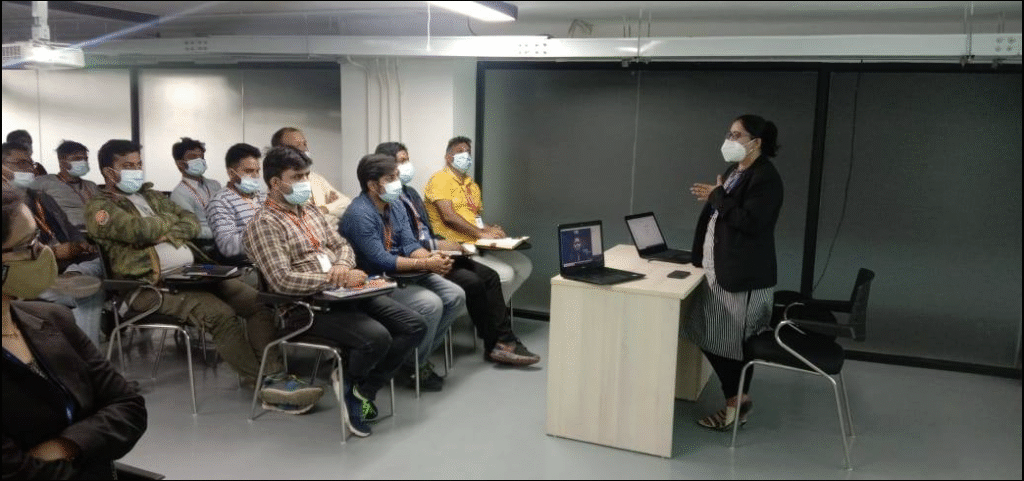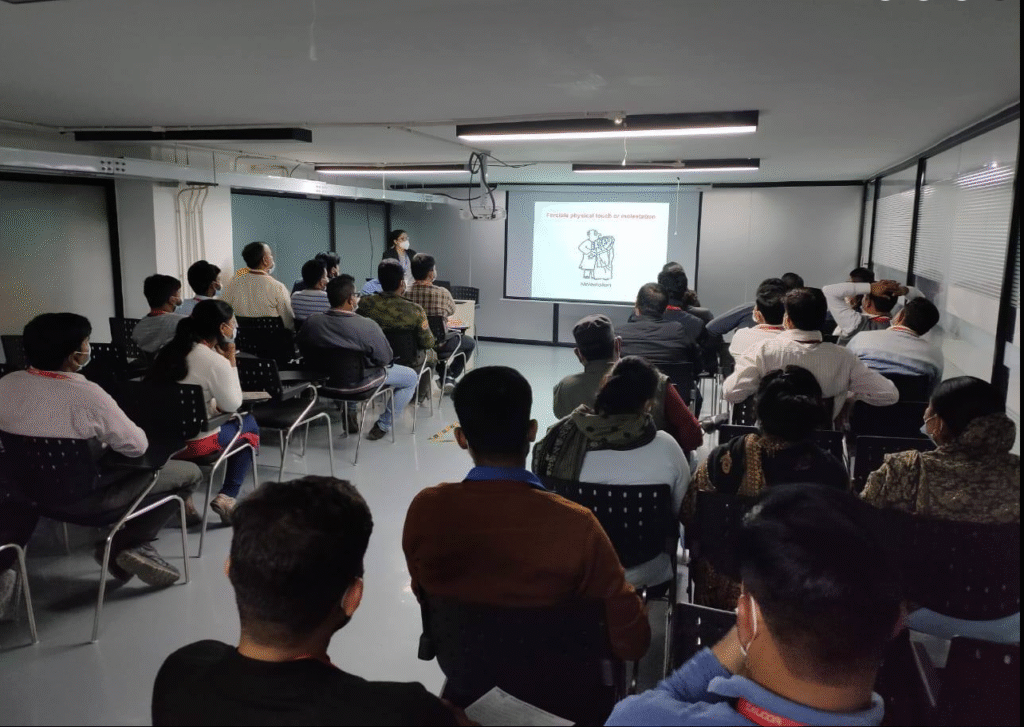The POSH Training at Legitralaw by Advocate Awanti Rai is designed to ensure adherence to the POSH Act, 2013, while fostering a workplace environment rooted in dignity and respect. This comprehensive program covers critical topics, including the definition of sexual harassment, the responsibilities of employers and employees, and effective complaint handling with a focus on confidentiality and empathy. Participants will engage in real case discussions and role-plays, enhancing their understanding of the Internal Committee’s composition, powers, and procedures, as well as essential documentation practices. By appointing an external ICC member, organizations can effectively mitigate risks associated with non-compliance and promote a positive workplace culture. The training emphasizes the importance of proactive measures to prevent harassment before it occurs. Participants will learn strategies to create an inclusive environment that encourages open communication. Evaluating the effectiveness of existing policies and practices is also a key component of the program. By fostering awareness and accountability, organizations can build trust among employees and enhance overall morale. Ultimately, the goal is to empower individuals to contribute to a safe and respectful workplace.

What We Cover
What Your Team Will Learn: Participants will gain a comprehensive understanding of the POSH Act, including its significance and legal implications. The training will equip team members with practical strategies to identify, prevent, and address issues of harassment in the workplace. Moreover, attendees will explore the importance of fostering a respectful environment and will learn the procedures for reporting incidents effectively. This training aims to empower employees to contribute to a safe and inclusive workplace culture during the POSH Training at Legitralaw by Advocate Awanti Rai.
Sexual harassment in the workplace encompasses a range of unwelcome behaviors that create a hostile or intimidating environment. This includes, but is not limited to, inappropriate touching, suggestive comments, sharing explicit materials, and any form of coercion or retaliation related to sexual advances. Understanding these behaviors is crucial for employees to recognize and address harassment proactively. The POSH Training at Legitralaw by Advocate Awanti Rai aims to clarify these definitions, ensuring that all participants are equipped to uphold a respectful workplace culture.
Employers are mandated to establish a robust framework for addressing sexual harassment, which includes implementing policies, conducting regular training, and fostering an environment that encourages reporting. Employees play a critical role in maintaining workplace safety by understanding their rights and responsibilities, actively participating in training sessions, and reporting any instances of harassment or misconduct. The Internal Complaints Committee (ICC) is tasked with investigating complaints impartially and providing a resolution while ensuring confidentiality and protection for complainants. Through the POSH Training at Legitralaw by Advocate Awanti Rai, all parties are educated on their respective roles in promoting a safe and dignified workplace.
Effective complaint handling is essential in maintaining workplace integrity, emphasizing the importance of confidentiality and empathy. During the POSH Training at Legitralaw by Advocate Awanti Rai, participants learn the significance of protecting the identities and details of those involved in complaints to foster a safe environment for reporting. Furthermore, addressing complaints with empathy allows organizations to support complainants adequately, acknowledging their experiences and emotions while guiding them through the resolution process. This dual focus on confidentiality and empathy ensures that all employees feel valued and secure in voicing their concerns.
Real case discussions and role-plays are integral components of the POSH Training at Legitralaw by Advocate Awanti Rai. These interactive elements provide participants with practical insights into handling actual workplace scenarios, reinforcing the theoretical knowledge imparted during the training. By engaging in role-plays, employees can practice their responses to various situations, enhancing their ability to manage complaints effectively and sensitively. This hands-on approach not only deepens understanding but also instills confidence in navigating the complexities of workplace dynamics.
Under the POSH Act, 2013, proper documentation and adherence to timelines are crucial to ensure transparency, accountability, and fairness in the inquiry process. Once a written complaint of sexual harassment is received, it must be filed within three months of the incident (extendable by another three months if justified in writing). The Internal Complaints Committee (ICC) must acknowledge receipt and begin proceedings promptly, maintaining a confidential case record that includes the complaint, statements of both parties, witness testimonies, and all supporting documents or evidence. If conciliation is requested, it must be completed before the formal inquiry begins. The ICC is required to complete the inquiry within 90 days of receiving the complaint and submit its final report to the employer within 10 days thereafter. The employer must then act on the ICC’s recommendations within 60 days—such as disciplinary action, compensation, or preventive steps. All records, including reports and minutes, must be securely maintained for at least three years to ensure compliance and enable future reference.
Annual compliance and reporting form an essential part of an organization’s obligations under the POSH Act, 2013. Every employer is required to ensure that the Internal Complaints Committee (ICC) not only functions effectively but also maintains proper records of all complaints, inquiries, and outcomes throughout the year. At the end of each calendar year, the ICC must prepare an Annual Report containing details such as the number of complaints received, disposed of, pending cases, and the actions taken by the employer based on ICC recommendations. This report is submitted to the District Officer designated under the Act and also forms part of the organization’s internal compliance documentation. Additionally, employers are expected to include a statement in their annual board report or HR compliance report confirming that the company has implemented the provisions of the POSH Act, conducted awareness programs, and constituted a functional ICC. Timely and accurate reporting not only fulfills statutory requirements but also reflects the organization’s genuine commitment to maintaining a safe, equitable, and legally compliant workplace
For effective implementation of the POSH Act, 2013, Managers and HR professionals play a pivotal role as the first line of communication between employees and the organization. They must be well-versed with the law and act with sensitivity, neutrality, and confidentiality in all matters concerning workplace conduct. Managers and HR must encourage employees to speak up without fear of retaliation, ensure complaints are promptly forwarded to the Internal Complaints Committee (ICC), and refrain from conducting informal inquiries or influencing either party. They should maintain a respectful environment, avoid making personal judgments, gossip, or sharing any confidential details related to a complaint. HR personnel must also ensure timely organization of awareness sessions, proper documentation of ICC proceedings, and inclusion of POSH compliance in the company’s onboarding and policy manuals. The key “do’s” include listening empathetically, maintaining neutrality, supporting fair inquiry, and ensuring preventive actions; while the “don’ts” involve avoiding bias, coercion, victim-blaming, or disclosing information. By following these principles, Managers and HR reinforce trust, fairness, and a culture of dignity within the workplace
The Internal Complaints Committee (ICC), mandated under the POSH Act, 2013, plays a vital role in ensuring a safe and respectful workplace for all employees. Every organization with ten or more employees must constitute an ICC comprising at least four members—a Presiding Officer, who must be a senior woman employee; two or more members from among employees committed to gender sensitivity or possessing legal or social work experience; and one external member from outside the organization who is familiar with issues relating to sexual harassment. At least half of the members must be women. The ICC holds powers similar to a civil court, enabling it to summon witnesses, call for documents, examine evidence, and recommend suitable action based on its findings. It receives and investigates complaints of sexual harassment, ensures confidentiality, and submits its report with recommendations to the employer within a stipulated time. The committee may suggest disciplinary measures, compensation, or corrective actions and must prepare an annual report of cases handled. By operating with neutrality, empathy, and adherence to due process, the ICC serves as the cornerstone of workplace safety and legal compliance.
In-Session Moments

Why Appoint an External ICC Member
Why Your Organization Needs a POSH Expert
Under the POSH Act, 2013, every workplace employing ten or more individuals is legally obligated to constitute an Internal Committee (IC), conduct annual awareness and sensitization trainings, and appoint a qualified External ICC Member to ensure impartiality and legal compliance. Failure to meet these obligations can lead to monetary penalties, cancellation of business licenses, and serious reputational damage, reflecting poorly on the organization’s integrity and governance standards. By appointing Adv. Dhanwanti Rai, a seasoned Supreme Court Lawyer and certified POSH Trainer, organizations not only ensure complete legal adherence but also benefit from her expertise in fostering a culture of respect, accountability, and inclusivity at the workplace. Her bilingual, experience-based training sessions help employees understand both the spirit and substance of the law, while her role as an External Member guarantees fair inquiry processes and credible compliance documentation. This holistic approach protects the organization legally and strengthens its ethical and cultural foundation.
https://www.youtube.com/@kanoonifriend
https://www.instagram.com/d_awanti?utm_source=ig_web_button_share_sheet&igsh=MTllenRkd3M5b28ydg==